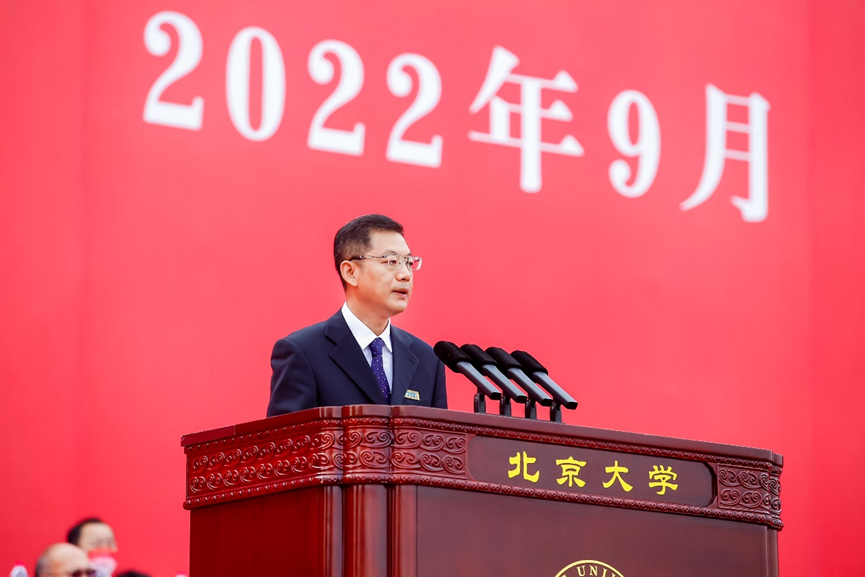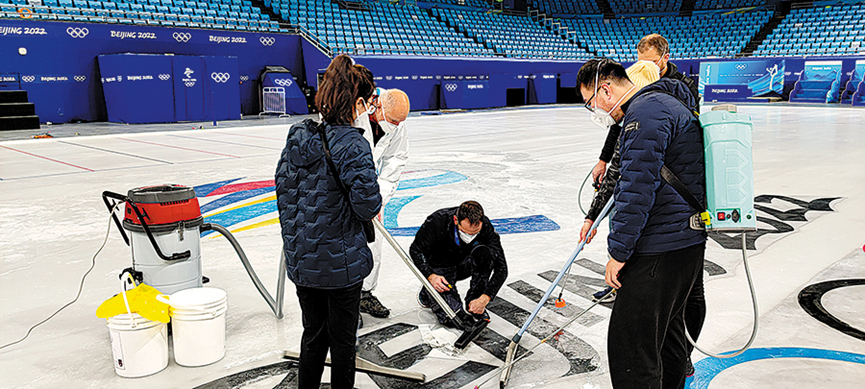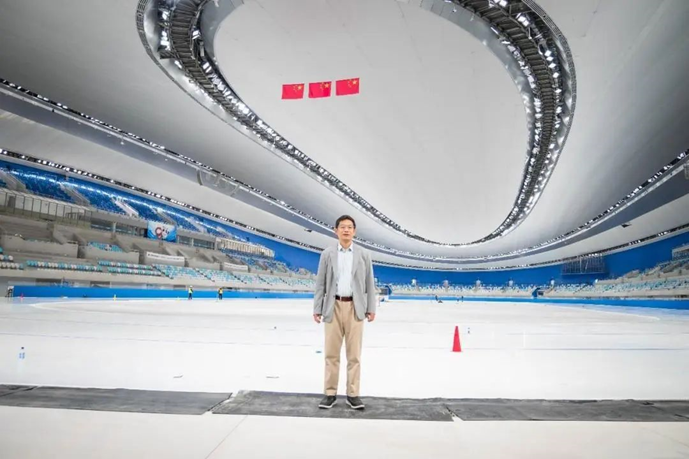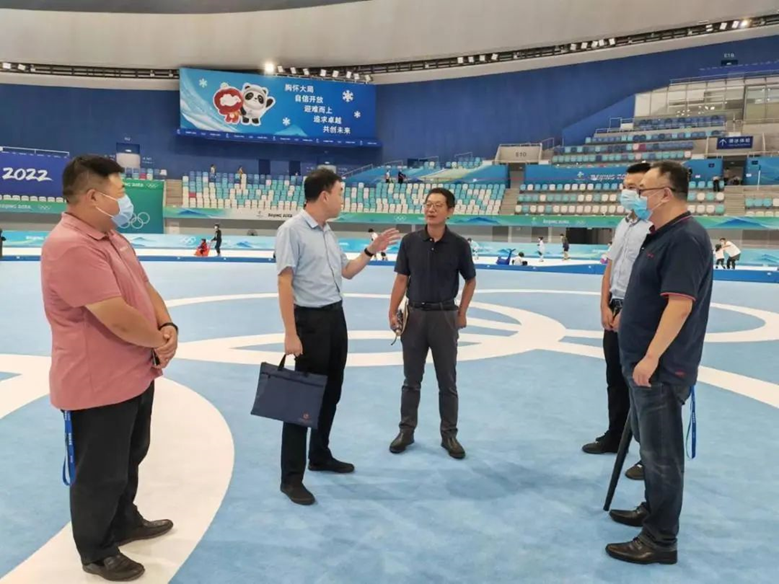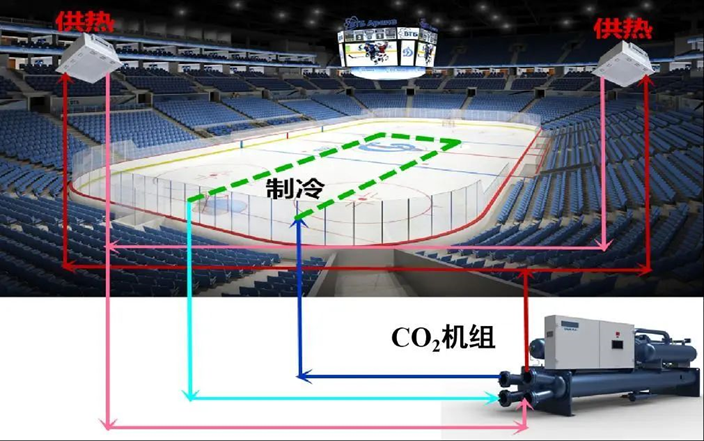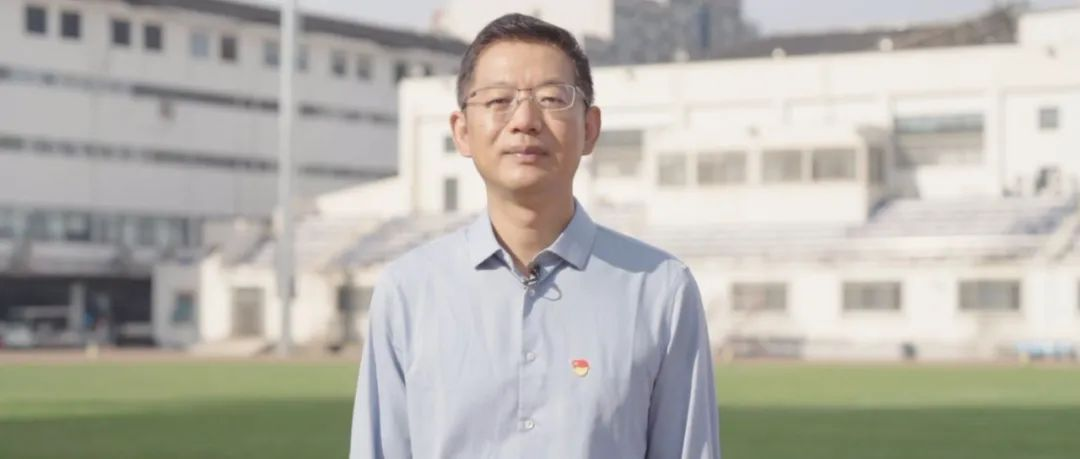Zhang Xinrong speaking as the teacher representative at the 2022 opening ceremony of Peking University
Peking University, October 17, 2022: Zhang Xinrong, professor of the PKU College of Engineering (COE) who is also a member of the Communist Party of China (CPC), led his team to develop the Transcritical Carbon Dioxide (CO
2) Direct Cooling Technology. This technology helped create the “fastest and most environmentally-friendly ice” in the history of the Winter Olympics at the 2022 Beijing Winter Olympics. This is only the starting point of Zhang's journey to turn CO
2 from “waste” to “treasure.”
The Capital Indoor Stadium boasts eco-friendly ice-making systems that use carbon dioxide as a refrigerant-a first for the Winter Olympics. XINHUA
Making History at the Winter Olympics
Under the crystal ice surface of the National Speed Skating Stadium, what flows is no longer the traditional refrigerant Freon, but CO
2, the "greenhouse gas" that has been troubling mankind. This time, however, the CO
2 is in liquid form, absorbing heat during evaporation and circulating to make ice. Zhang and his team at the COE have created the “fastest-making and the most environmentally-friendly ice” in the history of the Winter Olympics, with an overall ice surface difference of no more than 0.5℃. This is not only a breakthrough in technology for the Winter Olympics; it also demonstrates the possibilities of newer and more environmentally-friendly ways of utilizing energy.
“Every year there are about 46 billion tons of CO
2 emissions worldwide, but they are actually valuable resources that can be used in the future,” Professor Zhang explained.
Zhang Xinrong on the "Ice Ribbon" at the National Speed Skating Stadium
Zhang Xinrong (3rd from left)
Schematic diagram of the initial integrated CO2 cooling-and-heating unit
“The application of large-scale CO
2 refrigeration and its transcritical total heat recovery technology at the Beijing 2022 Olympic Games is just a starting point for future applications in many other fields such as energy. From the heat-hazard treatment in deep mines, eliminating COVID-19, to replacing Freon in cold chains, we are turning hazards into treasure,” said Zhang.
A Difficult Journey in Scientific Innovation
Today, the replacement of Freon with CO
2 seems inevitable, but just over twenty years ago, this was only a theoretical possibility. When Zhang, then a young scholar, first proposed using CO
2 for energy conversion, his idea was highly criticized and rejected.
“There was a time when my paper was evaluated by 16 peers, and the most frequently asked question was ‘Why did you propose carbon dioxide when no one else does?’ I then answered their questions one by one but the paper was eventually rejected. At that time, no one believed that CO
2 could generate electricity, but I thought that the more difficult it was to do research, the more we should persevere. So, I kept on researching how to use CO
2 to generate electricity and to cool,” said Zhang.
Rising up to the Needs of the Nation
At the 21st United Nations Climate Change Conference in 2015, China took the lead in signing the Paris Agreement and actively worked with the G20 and the international community to improve the global environmental governance regime. China also took the initiative to incorporate the carbon peak and carbon neutrality targets into its overall national development agenda. These climate commitments would not have been possible without the strenuous efforts to promote climate technologies.
“The utilization and conversion of CO
2 to improve energy efficiency and attain carbon neutrality require an interdisciplinary approach,” Zhang said, “and we, as researchers at PKU, see it as our duty to conduct comprehensive and interdisciplinary research in this area.”
For twenty years, Zhang has always insisted on putting scientific research into practical use, creating real value for society and contributing to national development. After China’s success in bringing a green Olympics into fruition, Zhang and his team are more determined to forge ahead and write a new chapter of China’s new energy development.
About Professor Zhang
Zhang Xinrong is a professor and doctoral supervisor at the College of Engineering of Peking University, director of the Beijing Engineering Research Center of City Heat, and president of the Beijing Society of Energy. He is a famous research scientist in the field of thermodynamic cycle of natural refrigerants as well as their heat and mass transfer, and the founder of several thermodynamic cycles of natural refrigerants of CO
2 for power generation, cooling and heat production. He has published more than 180 papers in international journals and has granted and applied for more than 60 patents. He has been listed in the “Career-long Impact” and “Single Year Impact” rankings of the World’s Top 2% Scientists and has received many honors such as the Elsevier’s Highly Cited Chinese Researchers in the field of energy, and First Prize in the Beijing Municipal Science and Technology Award. He was also honored for his outstanding contributions to the Beijing Winter Olympics.
Written by: An Xinyu
Edited by: Su Huangyi
Source: PKU News (
Chinese)
